Books
Books
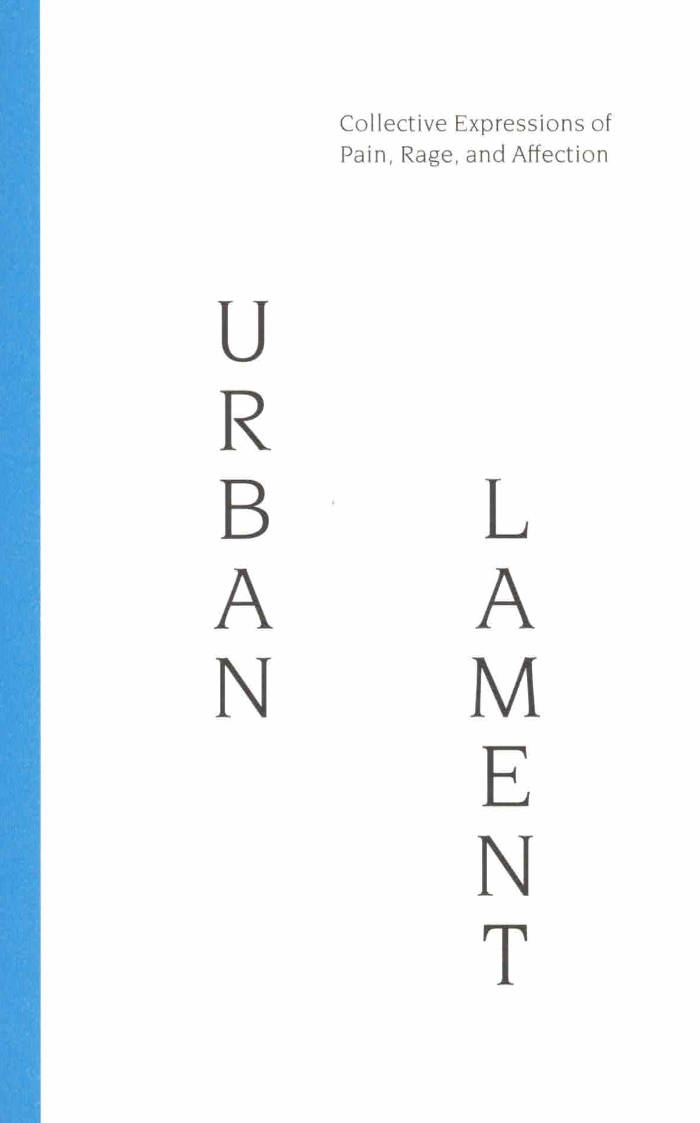
Urban Lament
Sofia Grigoriadou, Eliana Otta and 1 more
Lamentation practices can empower the potentiality to defy patriarchal orders ruling everyday life. Always a collective process, lamentation inscribes loss and vulnerability by tending bridges towards the world of the dead and the more-than-human. Gestures such as singing or breathing, gathering, and performances that exceed rationality can inspire a renewed approach to life and death, rural and urban. After all, amidst ongoing processes of extinction, how to mourn a queer activist, a Roma father, a burnt forest, an exiled body, and a ship sunken in the Mediterranean? How to experience loss not as something individual, but within an expanded continuum of pain? How to explore emotions beyond the private sphere? Through case studies and narrations, in different times and geographies surrounding the Aegean Sea, this book amplifies the echoes of collective tears to invigorate contemporary mourning practices that claim public space by grief, rage, and affect.

Islands After Tourism
Tourism does more than transforming spaces and forcing emotions: its geographies also conceal a persisting power that captures the imagination. In their operational sturdiness, tourismscapes appear intractable and inert, making their alternative renderings almost unthinkable. It feels uncanny to picture islands and their coasts freed from programs of leisure. But in recent years, the exhaustion of people and landscapes has brought forth a renewed imperative to think outside this ubiquitous extractive industry. Through essays, pieces of fiction, and visual references, this book discusses both the difficulty and the necessity of disrupting the monocultural imaginations of tourism. To escape the devouring vortex of its sticky nature and messianic promises, the cultural and political work necessary is not only this of negation and resistance, but also that of bold re-conceptualizations and re-imaginings.

In the Mirror of Care Work
Ar Utke Acs, Inga Gerner Nielsen
In the Mirror of Care Work was initiated by Inga Gerner Nielsen and Ar Utke Acs, two Danish artists whose work spans immersive performance, dance, choreography, curation and sociology. At two events in 2021 and 2022 that hosted dialogues between nurses and interactive performers, Nielsen and Acs began collecting stories and responses to conversational exercises, the latter of which revolved around questions such as – What can performance artists learn from nurses? How does the interactive performer's engagement with the audience correlate with the nurse's work with a patient? What skills, techniques, and strategies might these two fields share?
The exchange of knowledge from these two gatherings formed the basis of an ongoing dialogic project, as well as the content of this publication, which has been supplemented with seven essays by nurses, educators, performance theorists and performers. The book includes a series of drawings commissioned from artist Marit Benthe Norheim, graphics by TABLOID Press co-director Nat Marcus, and photographs of a performance installation staged by Nielsen and Acs in the Department of Nursing Education at University College of Northern Denmark – Hjørring.
Edited by Inga Gerner Nielsen and Ar Utke Acs, editorial assistance from Nat Marcus.
With essays by Elvira Crois, Majula Drammeh, Vienne Chan, Helle Kronborg Krogsgaard, Tyra Wigg, Rikke Steen Mapstone and Ar Utke Acs.

Basic Mechanics
Isabelle Weber, Maud Gyssels and 1 more
Basic Mechanics is a hold-loose collection of words as findlings and carriers, that hold or lose meaning. Consequently, a description of this work will never simply come out of one’s mouth. The narrative will seem tied together with loose threads. As Ursula K. Le Guin writes in The Carrier Bag Theory of Fiction, we know the story of the hero with the spear and the violence and the teleological progression. But isn’t the story that can be told by all, one of carrying and being carried? Isn’t language a wrapping for all those contradictory and wondrous thoughts and feelings? And can they be captured on paper, for a while, and set free again to counterbalance the killer story?
Confessing secrets and desires to each other became a method of sharing. Accompanied by giggles, we somatically connected the stories we carry, which we (dare to) place with another, which move from the inside out. This publication spills, soaks, opens and closes to confessions, poems and drawings in looping motifs. A shell swimming in a sea of words.

CUNY Center for the Humanities
Lost & Found: The CUNY Poetics Document Initiative, Series VI
Lost & Found: The CUNY Poetics Document Initiative publishes unexpected, genre-bending works by important 20th century writers. Unearthed from personal and institutional archives in the United States and abroad, these materials are edited by doctoral students at the Graduate Center, CUNY.
LOST & FOUND SERIES VI presents work by Gregory Corso, Judy Grahn, Bobbie Louise Hawkins, and Ted Joans. While the styles and experiences of these writers are radically different, each project presented here enacts a commitment to the exploration of knowledge unbound by disciplinary constraints.
Gregory Corso: Naropa Lectures 1981, introduced by Anne Waldman, includes two transcribed and annotated lectures that illustrate Corso's vast storehouse of cultural knowledge, animating his poetics both on the page and in the classroom.
Bobbie Louise Hawkins: The Sounding Word presents two very different lectures from the Jack Kerouac School of Disembodied Poetics, and a new interview with the author. Whether looking at iconic French novelist Colette or examining the poetics of prose, The Sounding Word describes an unflinching empirical approach to knowledge and its transmission through direct experience.
Judy Grahn: Selections from Blood, Bread, and Roses explores mythic, societal, and personal relationships to menstruation throughout time, and is accompanied by a recent interview with the legendary poet, teacher, scholar, and activist.
Ted Joans: Poet Painter / Former Villager Now / World Traveller, introduced by Diane di Prima, presents an array of previously unpublished texts on jazz, surrealism, travel guides to Africa and Paris, his inimitable Negative Cowboy, and photographs from his life and times. As writers, each considers and refigures the malleable conditions of historical truth and the pursuit of knowledge as part of their creative process. And as readers, we are encouraged to do the same.
SERIES VI includes:
Gregory Corso: Naropa Lectures 1981 (Part I & II) (ed. William Camponovo, Mary Catherine Kinniburgh, Öykü Tekten)
Bobbie Louise Hawkins: The Sounding Word (ed. Iris Cushing)
Judy Grahn: Selections from Blood, Bread, and Roses (ed. Iemanjá Brown & Iris Cushing)
Ted Joans: Poet Painter / Former Villager Now / World Traveller (Part I & II) (ed. Wendy Tronrud & Ammiel Alcalay)
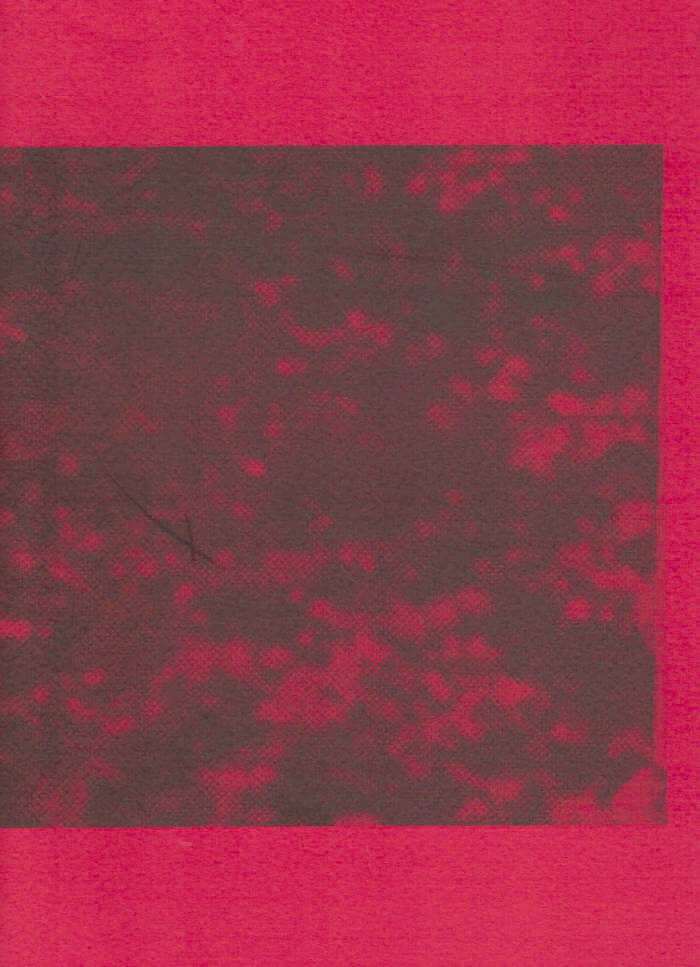
Prison, Poetry, Martyrdom
Saïda Menebhi, the Moroccan Years of Lead
A selection of poems by the Moroccan Marxist, feminist and poet Saida Menebhi, who died in prison on hunger strike in 1977, aged 25, after being imprisoned for her political organising against the Moroccan state. Translated from French to English for the first time, the zine contains a selection of the poems Saida wrote during her time in prison, shortly before her death. It also includes an essay on the Years of Lead in Morocco - specifically the 70s - as well as the conditions of prison, hunger strikes, poetry, and martyrdom (from an internationalist position: including Bobby Sands and the republican hunger strikes).

In the Jungle There Is Much to Do
Originally written as letters from enclosure, In the Jungle There Is Much to Do came out of the words and drawings sent by Mauricio Gatti, a young anarchist, to his three-year-old daughter, while he was imprisoned in military barracks in Montevideo. In 1972 the compiled letters were made into a book published by his comrades from the commune Comunidad del Sur. It tells the story of an elephant, a snail, a turtle, a seal, and a bird. They are all trapped by a hunter, who understands nothing of the jungle and who locks them up in the city zoo, where they miss their home and little ones. This fable for all ages about political prison was republished by different small organizations associated with the international solidarity movement supporting Latin American political refugees in the 1970s and 1980s.
Among these editions was a coloring book published in the GDR, which we used as a basis for a new German edition. The original text by Gatti was translated into English for the first time. Both language editions were published by the 11th Berlin Biennale in the fall of 2019. The curatorial team of the Berlin Biennale has decided to make these publications freely accessible on the website. The book is available for download and print-out, and a special black-and-white version has been created for free coloring.

The Posthumanist #2 Rhythms / Rhythmen
The Posthumanist is a bi-annual English and German magazine featuring art, design, technology and writing. Each issue presents one theme from various more-than-human perspectives, inviting readers to imagine what living together on planet earth is and could be.
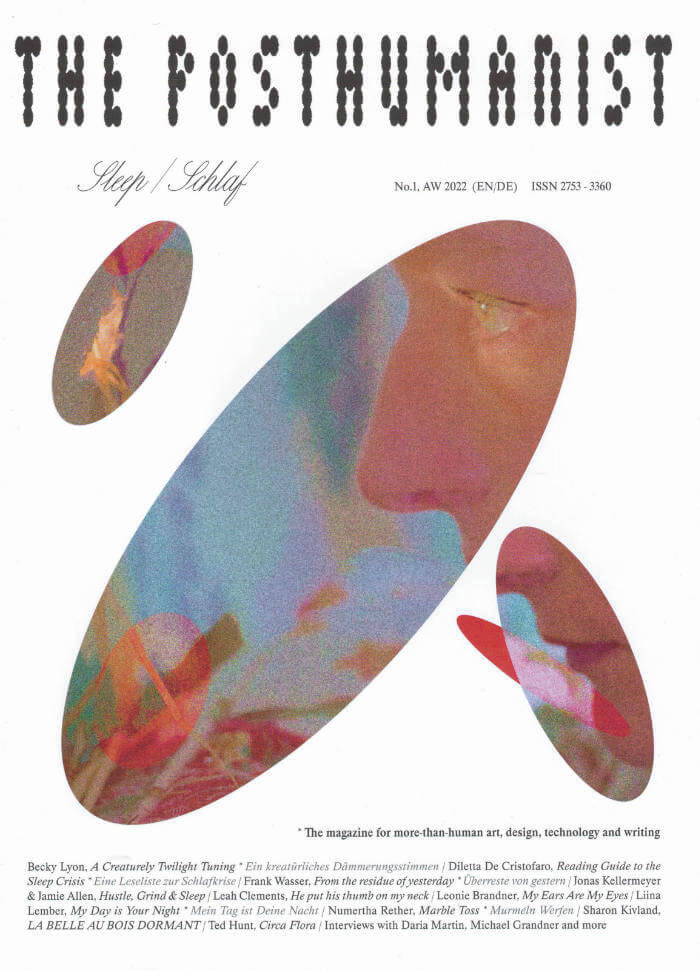
The Posthumanist #1 Sleep / Schlaf
The Posthumanist is a bi-annual English and German magazine featuring art, design, technology and writing. Each issue presents one theme from various more-than-human perspectives, inviting readers to imagine what living together on planet earth is and could be.
The idea for the publication emerged from a desire to discuss concepts and expressions of critical posthumanism and feminist new materialism in public contexts and to explore what inclusive futures could feel like.

Solidarity Must Be Defended
Eszter Szakács, Naeem Mohaiemen
The anthology Solidarity Must Be Defended brings together projects on gestures and alignments within the visual arts around transnational solidarity during the Cold War. In dialogue with, among others, the quietist tendencies of non-alignment and the radical vector of liberation movements, the book looks at both grand initiatives and tragic misfires from an entangled, decolonizing world. The point of departure for this anthology is a special issue of Mezosfera magazine (“Refractions of Socialist Solidarity”) edited in Budapest by Szakács in dialogue with Mohaiemen’s three-channel film Two Meetings and a Funeral (2017). This anthology proposes that transnational solidarity is always worth celebrating, but also extremely difficult to inhabit.
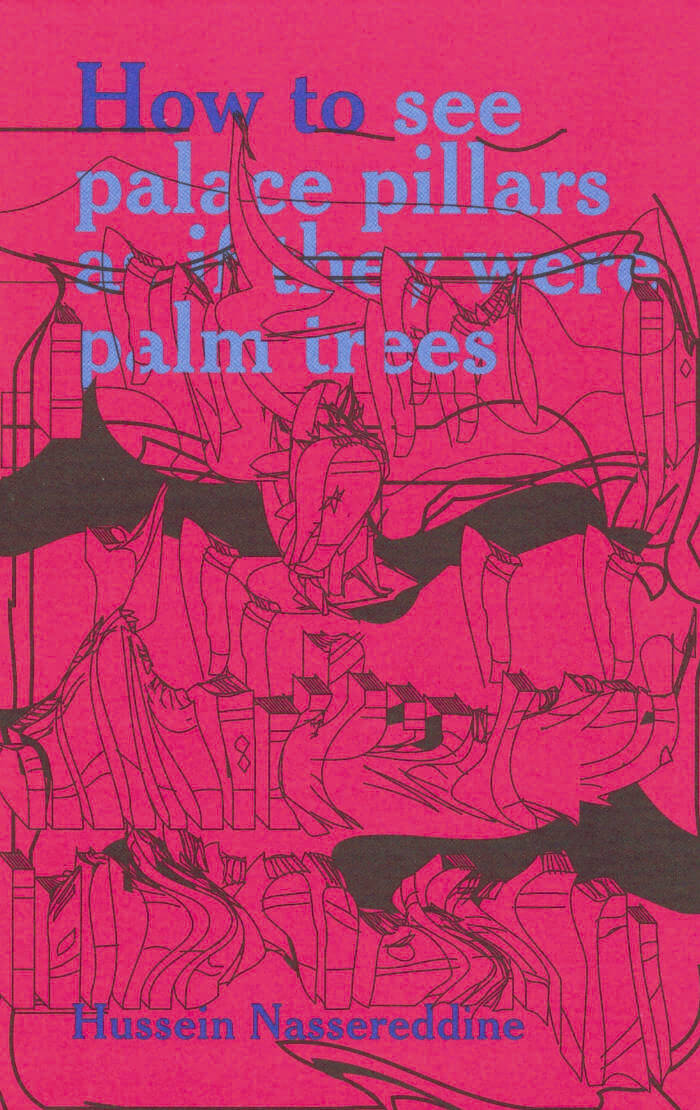
How to see palace pillars as if they were palm trees
For so it happens that when the poets speak, objects appear closer to their own shadows. The poet's mouth fills up with horses and marble, and his verses start to shine like rivers. These rivers then turn back to flow through the very palace he is depicting. The poet's own words begin to weigh down on him, as though he were holding up a palace with his palms. Then he travels, and the palace is obliterated. Countries and nations change, and naught remains but what the poets had seen. Of what the poets had seen, naught remains but its image in anthologies. And when the libraries have been flooded or burned to the ground, nothing but the commentaries on those anthologies are left, and all that one finds in these commentaries is that which was appropriated and wrought a thousand times over.
Hussein Nassereddine is a multidisciplinary artist. His work in installation, writing, video and performance originates from a practice around language that builds fragile monuments - some verbal, some sonic, some tactile - rooted in collective histories and resources of poetry, ruins, construction and image-making.
Translated from Arabic by Ben Koerber.

How to make female action heroes
M was exasperated by her friend's frivolous attitude toward the tragedy of losing a role. She was not trained to read the potential in R's wild imagination. Was it a commitment to realism, trained by the ideological morality of activism, that made her unresposive to the fantasy genre and vigilante characters? R's instinct was to court the unfamiliar, whereas M's training was to engage with criticality. Both these attributes could have interfaced in interesting and colourful ways, with sparks and currents, if and only if the social conditions of the time had been conducive to the arrival of a vigilante.
Madhusree Dutta is a filmmaker, curator and author based in Mumbai and Berlin. She has been the executive director of Majlis Culture, a centre for rights discourse and art initiatives in Mumbai, 1998-2016; and artistic director of Academy of the Arts of the World in Cologne, 2018-2021. Her areas of interest are documentary practices, urban cultures, migration movements, transient identities, and lived-in hybridity.

Alien Daughters Walk Into the Sun: An Almanac of Extreme Girlhood
The early writings of renowned poet and critical theorist Jackie Wang, drawn from her early zines, indie-lit crit, and prolific early 2000s blog.
Compiled as a field guide, travelogue, essay collection, and weather report, Alien Daughters Walk into the Sun traces Jackie Wang's trajectory from hard femme to Harvard, from dumpster dives and highway bike rides to dropping out of an MFA program, becoming a National Book Award finalist, and writing her trenchant book Carceral Capitalism. Alien Daughters charts the dream-seeking misadventures of an "odd girl" from Florida who emerged from punk houses and early Tumblr to become the powerful writer she is today. Anarchic and beautifully personal, Alien Daughters is a strange intellectual autobiography that demonstrates Wang's singular self-education: an early life lived where every day and every written word began like the Tarot's Fool, with a leap of faith.

Nice: Collected Poems
Collected for the first time, four landmark works of queer experimental poetry by reclusive cult poet David Melnick, known for his prowess with invented language and sound poetry.
David Melnick's Nice: Collected Poems spans twenty crucial years of gay life and experimentation with poetic form, bringing together four masterworks of American literature: Eclogs (1967-70), ten episodes in the urban afterlife of pastoral; PCOET (1972), written in an unknown tongue, verse for a world that's yet to be; Men in Aida (1983-85), Melnick's masterpiece, a giddy epic of queer community; and A Pin's Fee (1988), a backward glance and elegy, a cry of pain, howl of anger.
David Melnick was born in Illinois in 1938 and raised in Los Angeles, educated at the University of Chicago (where he studied with Hannah Arendt) and the University of California at Berkeley. Although he spent time in France, Greece, and Spain (whence his mother's ancestors emigrated in 1492), most of his adult life was centered in San Francisco. For an author's note he once wrote, "This poet's politics are left, his sexual orientation gay, his family Jewish.... He is short, fat, and resembles Modeste Moussorgsky in face and Gertrude Stein in body type and posture." A participant in the Free Speech movement, Melnick was a key member of G.A.W.K. (Gay Artists and Writers Kollective) and an early inspiration to the Language Poets. His masterpiece, Men in Aida, began in a reading group organized by Robert Duncan. Melnick passed away in 2022, a day before his 84th birthday.
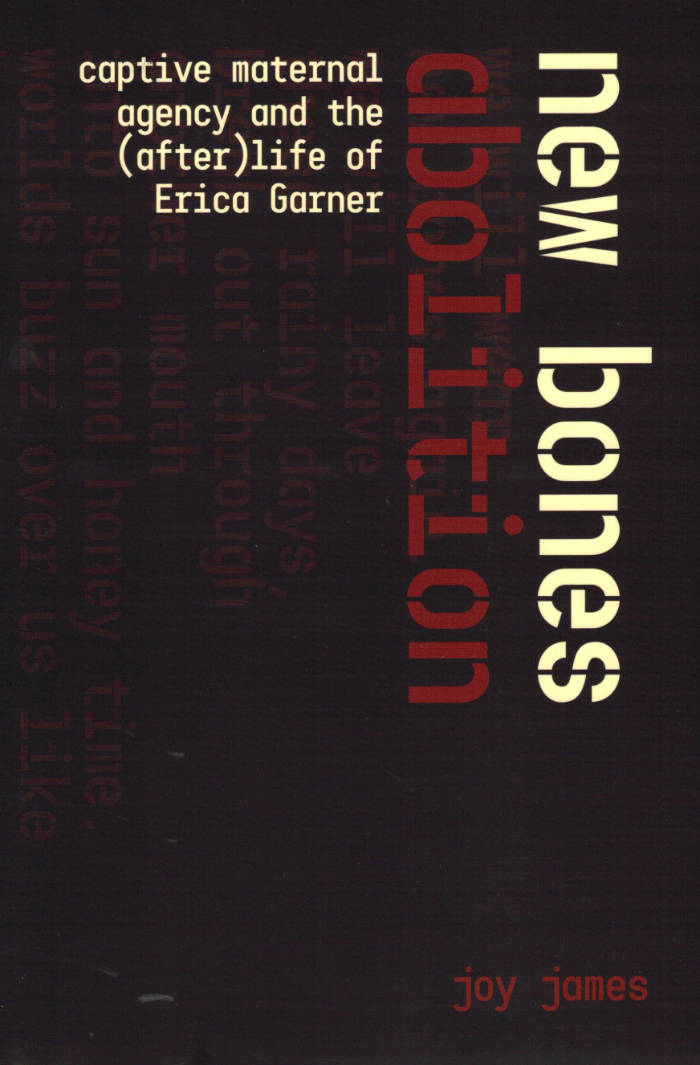
New Bones Abolition: Captive Maternal Agency and the (After)Life of Erica Garner
New Bones Abolition addresses "those of us broken enough to grow new bones" in order to stabilize our political traditions that renew freedom struggles.
Reflecting on police violence, political movements, Black feminism, Erica Garner, Mumia Abu-Jamal, caretakers and compradors, Joy James analyzes the "Captive Maternal," which emerges from legacies of colonialism, chattel slavery and predatory policing, to explore the stages of resistance and communal rebellion that manifest through war resistance. She recognizes a long line of gendered and ungendered freedom fighters, who, within a racialized and economically-stratified democracy, transform from coerced or conflicted caretakers into builders of movements, who realize the necessity of maroon spaces, and ultimately the inevitability of becoming war resisters that mobilize against genocide and state violence.
New Bones Abolition weaves a narrative of a historically complex and engaged people seeking to quell state violence. James discusses the contributions of the mother Mamie Till-Mobley who held a 1955 open-casket funeral for her fourteen-year-old Emmett Till, murdered by white nationalists; the 1971 rebels at Attica prison; the resilience of political prisoners despite the surplus torture they endured; the emergence of Black feminists as political theorists; human rights advocates seeking abolition; and the radical intellectualism of Erica Garner, daughter of Eric Garner slain in 2014 by the NYPD. James positions the Captive Maternal within the evolution of contemporary abolition. Her meditation on, and theorizing of, Black radicals and revolutionaries works to honor Agape-driven communities and organizers that deter state/police predatory violence through love, caretaking, protest, movements, marronage, and war resistance.
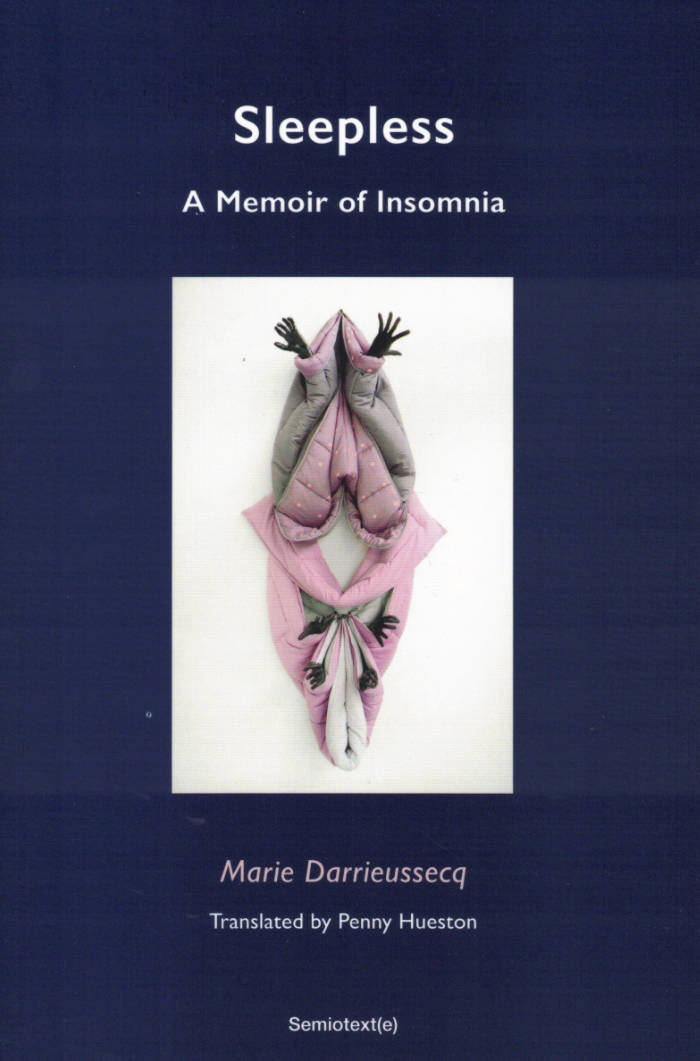
Sleepless: A Memoir of Insomnia
A restless inquiry into the cultural and psychic sources of insomnia by one of contemporary French literature's most elegant voices.
Plagued by insomnia for twenty years, Marie Darrieussecq turns her attention to the causes, implications, and consequences of sleeplessness: a nocturnal suffering that culminates at 4 a.m. and then defines the next day. “Insomniac mornings are dead mornings,” she observes. Prevented from falling asleep by her dread of exhaustion the next day, Darrieussecq turns to hypnosis, psychoanalysis, alcohol, pills, and meditation. Her entrapment within this spiraling anguish prompts her inspired, ingenious search across literature, geopolitical history, psychoanalysis, and her own experience to better understand where insomnia comes from and what it might mean. There are those, she writes, in Rwanda, whose vivid memories of genocide leave them awake and transfixed by complete horror; there is the insomnia of the unhoused, who have nowhere to put their heads down. The hyperconnection of urban professional life transforms her bedroom from a haven to a dormant electrified node.
Ranging between autobiography, clinical observation, and criticism, Sleepless is a graceful, inventive meditation by one of the most daring, inventive novelists writing today.

Firestar
«Avec Firestar, AD Rose tire une balle dans les jambes de celleux qui regardent leurs pieds» *
Une écriture dont le style évoque le rap, avec ses rimes, sa part de violence, de néologismes et d’égotrip, outil de lutte contre les injustices et l’ordre établi, celui de la langue comme celui de l’inceste. AD a 22 ans lorsqu’il quitte sa famille, écrit Firestar et nous accorde sa confiance pour le publier. Un travail testimonial rare sur les violences intra-familiales à la racine des systèmes de domination, un attentat poétique pour ne pas oublier.Lorsqu’en 2021 sa mémoire traumatique se réveille, AD Rose tente d'obtenir réparation auprès de ses parents, coupables de l'avoir incestué. Face au mur d’omerta auquel il se heurte, il trouve pouvoir dans l’écriture. Comme un réflexe de survie pour crier, sans demander la permission, libéré de la honte et des secrets. Un mouvement sans concession pour reprendre sa vie.
* Le texte est accompagné d’une préface de Victoria Xardel.
AD Rose est un poète français né en 1999. Il grandit dans le Tarn et le Tarn-et-Garonne, entre Vénès et Loze.
Victoria Xardel est une poète française née en 1987. Elle grandit en Alsace-Lorraine, entre Metz et Strasbourg.

18 Brum’Hair
Phœbe Hadjimarkos-Clarke, Martin Desinde
18 Brum’Hair est un recueil de poèmes écrits à quatre mains par Martin Desinde et Phœbe Hadjimarkos-Clarke au rythme du calendrier révolutionnaire. Si son titre fait référence—non sans un humour capillotracté—au coup d’État de Louis Bonaparte et au livre de Karl Marx traitant du dit-sujet, les auteur·ice·s écrivent ici en ping-pong sur notre temps présent et divaguent autour de sujets divers tels que l’état du monde, la vie urbaine, les drogues et l’alcool, la séduction, la sexualité, l’amour, le chagrin, l’amitié, la révolution... Ces 18 poèmes sont accompagnés de 12 allégories dessinées par Flore Chemin.
Un 18 brumaire littéraire, sans doute plus proche de la farce que de la tragédie.
Martin Desinde est auteur, éditeur et graphiste installé à Paris. Son travail fait dialoguer poésie et idéologie au travers de multiples formes: textes, objets éditoriaux, ready-mades, performances... Il fonde en 2017 la maison d'édition Dépense Défensive avec l’artiste Louis Somveille.
Phœbe Hadjimarkos-Clarke écrit des romans et des poésiesoù elle explore la vie organique et sentimentale au temps du capitalisme tardif. Elle vit dans de grandes villes et de petits villages.
Flore Chemin vit et travaille entre Paris et la Corrèze, sa pratique s’articule autour de la peinture, l’édition et l’installation. Elle y cultive une esthétique de l’à peu près qui répond à divers principes: faire d’abord / comprendre après, rester floue.s pour résister sous cape, inviter le monstre et les mauvaises herbes au cœur du jardin.
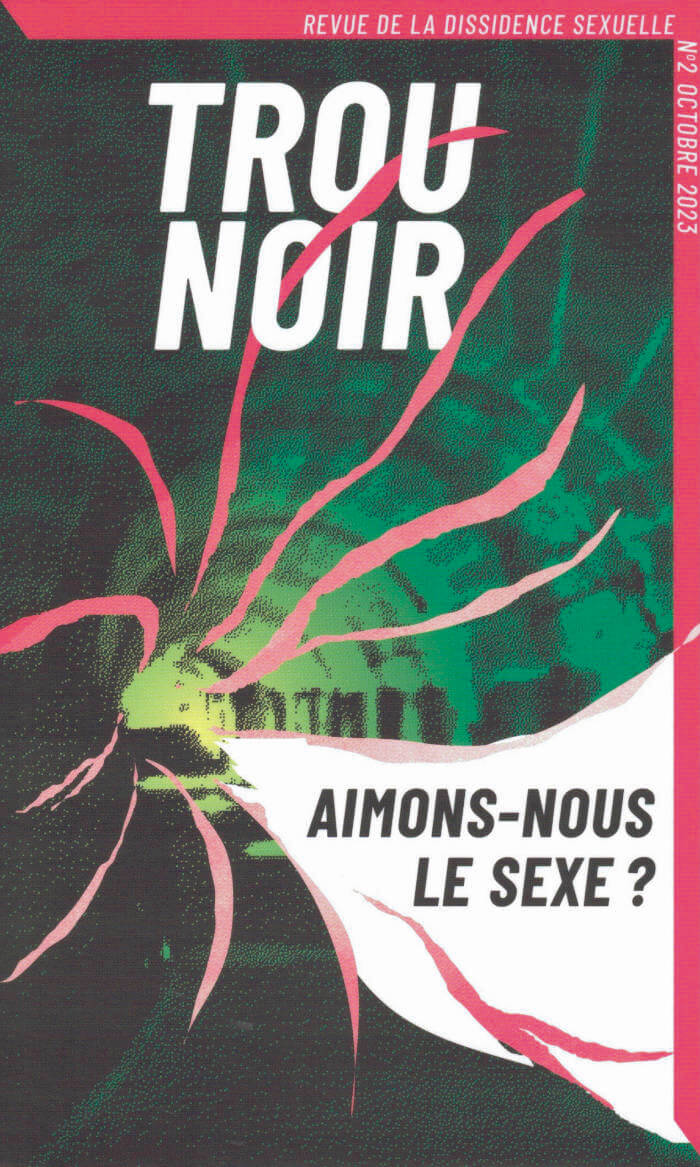
Trou noir, n°2 : Aimons-nous le sexe ?
Aimons-nous le sexe ? Ce numéro de Trou Noir cherche à explorer ce que le sexe et le politique auraient encore à fricoter ensemble, et à articuler nos paroles sans pour autant les faire se confondre. Bien sûr, répondre « oui » ou « non » à cette question ne relève pas de l’évidence et ne permettra pas de se situer sur une quelconque échelle de la dissidence sexuelle, mais y répondre quand même en allant puiser en soi-même, dans la littérature, dans la recherche, dans l’histoire, dans des expériences de groupe, dans toutes formes susceptibles de nous aider à penser le désir sexuel comme une résistance au pouvoir.
Sommaire
• Correspondance dans la galère de communiquer sur les insectes, le sexe et les faux problèmes – par L. Bigòrra & Brenda Walsh
• Ceci n’est pas une chatte – par Catalina Malabutch
• Fragments scatopolitiques – par Cy Lecerf Maulpoix
• Du sexe et des symbioses – par emma bigé
• Ça ressemble au sexe – par Mickaël Tempête
• Queer cruising – par Gorge Bataille + Saram
• Le caractère destructeur de la sexualité – par Quentin Dubois
• Se dire prosexe – par val flores
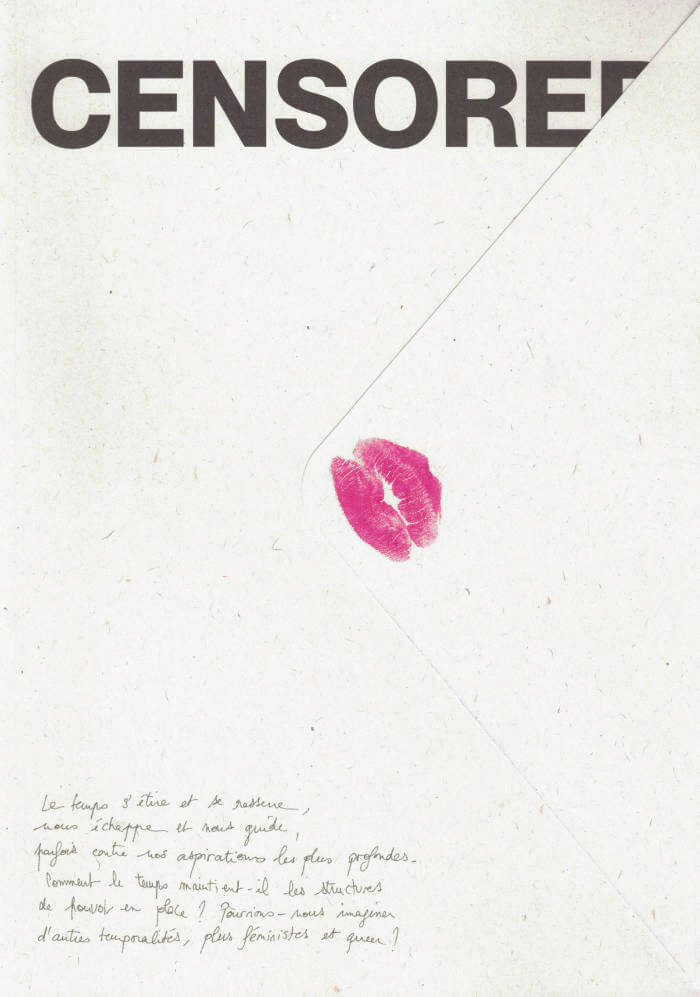
CENSORED 09 - It's About Time!
"Vous rappelez-vous de la dernière fois où vous vous êtes ennuyé·e ? Comment le temps maintient-il les structures du pouvoir en place ? Pourquoi la génération “working girl” ne fait-elle plus rêver ? Pourrions-nous imaginer d’autres temporalités, plus féministes et queer ? Dans son numéro “IT’S ABOUT TIME!” sous forme d’enveloppe géante, la revue Censored examine le concept du temps d’un point de vue féministe. Elle explore la manière dont le rythme de la vie est régi par des exigences sociales normées en abordant notre relation au travail, à la maternité, à la lutte et à la notion de liberté."
À travers des dialogues entre différentes époques, il explore des thèmes tels que la performance, les amitiés créatives et le repos et le divertissement. L’édition inclut des archives, dont un entretien entre Angela Davis et Toni Morrison, des lettres de plusieurs auteurices et poét-esses contemporain·es, des analyses, séries de photos ainsi que cinq cartes blanches à des artistes.

Les Éditions des mondes à faire
« Du fric ou on vous tue ! »
« Du fric ou on vous tue ! : j’ignore qui avait pu écrire ça sur un mur, au début des années 1980, à Marseille, mais j’avais bien aimé cette menace de braqueur qui résonnait là comme une injonction plus générale à ceux qui tiennent les cordons de la Bourse. »
Une association de hors-la-loi révolutionnaires, ainsi pourrait-on qualifier le groupe Os Cangaceiros, qui prit ce nom en hommage aux bandits du Nordeste brésilien. Ce livre raconte l’histoire de cette bande de jeunes qui, refusant d’aller travailler, s’était organisée pour arnaquer les banques et prêter main-forte aux luttes qui secouaient alors les prisons, les usines et les banlieues.
Ce récit de première main peut être lu comme une contre-histoire de la décennie 1980, durant laquelle se mit en place le régime de gouvernance que nous subissons depuis.
Alèssi Dell’Umbria est l’auteur de : Histoire universelle de Marseille. De l’an mil à l’an deux mille (Agone, 2006) ; C’est de la racaille ? Eh bien, j’en suis ! À propos de la révolte de l’automne 2005 (L’Échappée, 2006) (réédité et augmenté sous le titre La Rage et la Révolte en 2010 par Agone) ; Échos du Mexique indien et rebelle(Rue des cascades, 2010) ; R.I.P. Jacques Mesrine (Pepitas de calabaza, 2011) ;Tarantella ! Possession et dépossession dans l’ex-royaume de Naples (L’œil d’or, 2016) ; Istmeño, le vent de la révolte. Chronique d’une lutte indigène contre l’industrie éolienne, Livre-DVD (Collectif des métiers de l’édition / Les éditions du bout de la ville, 2018) ; Antimatrix (La Tempête, 2021).

Guerre Sonore
Le sonore excède nos capacités de pensée, il traverse toutes les échelles de la réalité et de la vie sociale, et nous permet d’expérimenter par avance les menaces du futur proche : ce sont les hypothèses que déploie dans sa Guerre sonore le DJ, producteur de bass music et théoricien Steve Goodman, mieux connu sous le pseudo Kode9, et formé au sein de l’Unité de Recherché sur la Cyberculture (CCRU) aux côtés de Kodwo Eshun et Mark Fisher. Guidé par les leçons des sound-systems et des raves, défiant le partage entre philosophie et science-fiction, il compose avec ce livre une vaste fresque fractale, qui analyse les limites de l’audible et les puissances sensorielles et spéculatives de la vibration. Guerre sonore décrit comment la maîtrise des infrabasses et l’occupation de l’espace sensoriel sont devenus l’enjeu d’une bataille secrète mais généralisée où les gouvernements, les spécialistes du marketing, les designers et les technoscientifiques s’affrontent au matérialisme des basses fréquences des artistes et des populations.
Steve Goodman (alias Kode9) est un musicien, écrivain et artiste. Il est l’auteur du livre Guerre Sonore et il codirigé les ouvrages Unsound : Undead (Urbanomic Press, 2019) et Ø (Flatlines Press, 2021). Il a fondé les labels Hyperdub et Flatlines, produit 5 albums, dont deux avec le regretté Spaceape (Memories of the Future, 2006 et Black Sun, 2012) et 3 en solo (Nothing, 2015, Escapology, 2022, Astro-Darien, 2022), de nombreuses compilations de mix DJ ; il a co-compilé et remixé Diggin in the Carts (2018), une collection de musiques rares de jeux vidéo japonais. Il a aussi, entre autres choses, conçu des installations sonores pour la Hyundai Commission à la Tate Modern en 2018 et pour l’exposition sur l’intelligence artificielle More than Human en 2019, au Barbican de Londres.

Rage Assassine: Mettre Fin au Racisme
Avant que Black Lives Matter et #MeToo ne viennent secouer l’Amérique et le monde occidental, bell hooks montrait, dans cet essai incisif, que l’abolition du racisme et l’éradication du sexisme vont de pair. Sans le féminisme, la lutte antiraciste reste une affaire d’hommes. Sans l’antiracisme, le féminisme s’expose à servir de courroie aux logiques de domination raciale. L'autrice insiste sur le bien-fondé de la rage qui anime les masses populaires et la jeunesse noire et sur la nécessité d’en faire un moteur de changement social radical. Elle propose une théorie et une pratique révolutionnaires, dont la fin est une communauté solidaire fondée sur l’égalité réelle et la volonté de tou.te.s de travailler au changement.
Traduit de l'anglais par Ségolène Guinard.
GLORIA JEAN WATKINS, connue sous son nom de plume BELL HOOKS, née en 1952, est une intellectuelle, féministe, et militante étasunienne. Elle a publié plus de trente livres et de nombreux articles, et est apparue dans plusieurs films documentaires. Traduits dans de nombreuses langues, ses ouvrages sont considérés parmi les plus importants sur la question aux Etats-Unis et suscitent un réel engouement en France depuis quelques années. Les éditions divergences ont déjà traduit et publié trois de ses ouvrages dont La volonté de changer et A propos d'amour.

Masturbatory Reader (2nd edition)
This Masturbatory Reader asks three main questions.
1. What power and pleasure can we access through attending to the erotics of knowledge production?
2. How are the sites, systems and tools of knowledge-making designed to reiterate violent norms (and in turn, erase deviant practices)?
3. What could the making (and unmaking) of these systems allow us to imagine?
To unpack these questions the edition gathers 16 contributors across 136 pages, conjuring the thinking (wondering, studying, lusting, sweating, ranting) of an expanding chorus of references that sit distances apart, folded here between facing pages. A chorus calling to action, calling to theory, calling to bed.
Featuring D Mortimer, Wes Knowler, Biogal, Tallulah Griffith, Brooke Palmieri, Carl Gent, Sophie Mak-Schram, Alice Butler, Jessa Mockridge, Nat Pyper, Alton Melvar M Dapanas, Sammy Paloma, Donna Marcus Duke, and Ryan Boultbee, with a forward by Emily Pope.
“In this anthology, reading is cruising, and cruising is reading.” – Sam Moore, ‘The (Bad) Taste Test: Radical Acts of Queer (Self) Pleasure in The Masturbatory Reader’, Polyester Zine